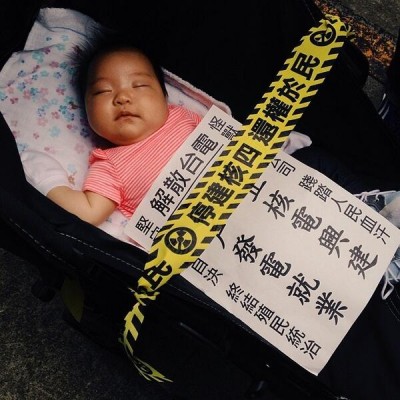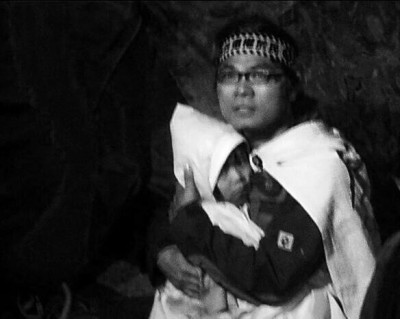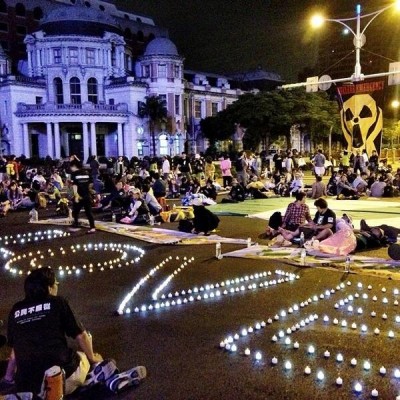
A baby sleeping at the anti-nuclear protest on April 27, 2014. The yellow banner says, “Stop the fourth nuclear power plant and give the right back to the people.” Photo by Instagram user vincentkensei. CC BY-NC 2.0
When Taiwanese police used powerful water cannons to evict anti-nuclear protesters on April 28 at 3 a.m., children were among the crowd.
Some protesters, who were rallying against the island's fourth nuclear power plant, had brought their young sons and daughters to the demonstration. The plant is now under security check and whether or not it would be put to operation would be decided by the result of an upcoming referendum.
Several newspaper columnists criticized those parents bringing their children to a protest scene as irrational for putting their children's lives in danger.
But protesting parents defended themselves, saying that the police should be the ones blamed and that their children also wanted to be heard:
清晨三點,警方開始從重慶南路那頭推進,現場民眾圍成很厚的人牆,試圖阻擋警察,不斷大喊帳棚有小孩,帳棚裡本來是有小孩,他們已經睡了,當時現場指揮官並未派出員警或是女性員警前來做柔性勸離,卻堅持以噴水車驅離,手持盾牌與警棍的警察也步步逼近,這些舉動讓擋在前頭奮力阻擋的反核民眾很驚恐,水車最後非常靠近,我們在民眾隔開的人牆護送下離開忠孝西路到一旁的人行道上,看到帳棚被警察一把舉起,直接用力甩開丟到隔壁車道,事先並沒有確認帳棚裡還有沒有人?
The police officers started the eviction at 3 a.m., and many protesters stood in front of us like walls and tried to stop them. They kept yelling that there were children in the tents and they were sleeping inside. The police commander insisted on using water cannons to evict protesters without sending police officers to arrange for the children to leave the scene. When the police officers with shields and rods approached and the water tank moved forward, the protesters in the front line were very anxious. They formed a human shield and helped us to move to the sidewalk on ZhongXiao West Road. We saw that police officers razed our tents and threw them into another lane before checking whether there were people inside.
我們在忠孝西路上靜坐的時候,有位六歲的小孩說,「我好希望政府跟在那些警察的後面噢,這樣他們就可以聽到我們的聲音,知道我們想要什麼、不要什麼。」孩子的願望多麼微薄,他只希望政府能在現場,但我要說的是,政府不應該站在警察的後面,應該站在警察的前面來傾聽兒童的心聲。
When we sat on ZhongXiao West Road, a six year-old told me, “I hope the government is with these police officers, so they can hear our voices and know what we want and what we do not want.” This is such a humble wish. He hopes the government could be there. What I want to say is that the government should not stand behind the police. Instead, the government should stand in front of the police so they can hear the words from these children.
Many of the parents who brought their children to the protest were members of the Association of Parent Participating Education in Taiwan. Shih-Che Lo, a member of this association, explained [zh] why the association provides support to parents who want to join the protests with their children:

A protesting mother brought her child away from the police and water cannons. Photo by Twitter user siegfy and retwitted by gjtaiwan. CC BY-NC 2.0
批評者說親子共學沒有站在小孩的立場想,出於他們對小孩的某些想像。這種想像看起來有兩個重點:(1)小孩很衰弱(需要被保護);(2)小孩沒有,或只有很低的理解力。
The critics said that our association does not put ourselves in the children’s shoes, based on their imagining of how children should be. They have two assumptions: (1) children are weak (so they need to be protected), and (2) children do not have or have only limited intelligence to understand the world.
把小孩的未來納入視野,一種不同的想像就出現了:(1)小孩雖然很衰弱,但他得慢慢學會堅強起來,有力量去抵抗;(2)小孩雖然理解力還不是很強,但他可以從現在開使學習思考,並且把思考當成一種習慣。
If we believe children are our future, a different understanding emerges: (1) these children are weak, but they will learn to be strong and have the strength to resist, and (2) although their intelligence is not very sufficient, they can start to learn how to think and turn thinking into a habit.
Ninjiatext, a blogger who focuses on ethical issues, also discussed [zh] the matter:
多數的父母應該會這樣認為:基於保護難度的問題,我可能不會帶小孩接近衝突現場。
但這種直覺的倫理判斷也會排除一些人:老人、身心障礙者。他們也難以保護自身的安全,難道他們就不能去現場抗爭嗎?坐輪椅吊點滴的就不能在第一線嗎?這似乎會排除他們的一些基本權力。
Most parents might think that it is difficult to protect their children in a clash, so they would not bring their children to a protest.
Nevertheless, this kind of intuitive ethic judgment will exclude some people [from being allowed to join the protest], e.g., the elderly and the handicapped. Shouldn't those who cannot protect themselves join the protest? Can’t those in a wheelchair and with an IV be present at the front line? This kind of reasoning might expropriate them from their basic human rights.
E Ting Ying was with some children on that early morning, and she described how the children faced the eviction:
我相信每個孩子在現場,都曾感覺到不安和害怕,正如每一個在現場的大人一樣。畢竟這就是政府與警察想要傳遞給我們的。
但孩子一點都不脆弱,也並非大人所想的,他們什麼都不懂。
這是一群在愛與尊重當中長大的孩子,他們是帶著對於這些事的了解,來到這裡。
知道自己為什麼在這裡,就有力量面對害怕。
I believe all the children there felt uneasy and scared just like the adults. After all, this is what this government and the police want us to feel.
Nevertheless, children are not as vulnerable and ignorant as the adults think.
These children grow up in an environment full of love and respect. They came to the protest because they know what happens. If they know why they are there, they would have the strength to face their fear.
Wei-Han Huang, a reporter at the protest, also described what went through his mind when he saw parents with their children:
我知道,我懂,我也不贊成讓孩子有一點點,身陷危險的機會。但大家有沒有想過?【核能】也可能讓台灣的孩子們,身陷危險之中。
I know, I understand, and I agree that we should not let children be exposed to potential danger. Nevertheless, have you considered that the nuclear power plants would also expose the children in Taiwan to danger?







